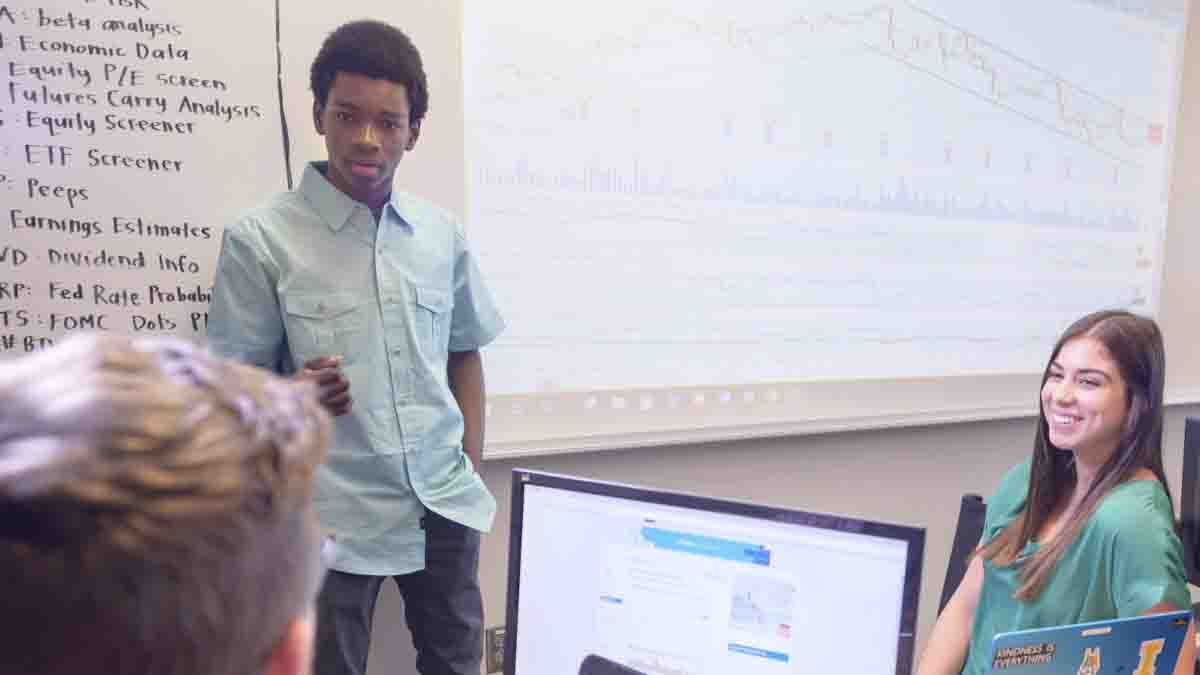Hands-on New Minor
August 07, 2024
A new minor in agricultural commodity risk management (ACRM), offered cooperatively by the College of Agricultural and Life Sciences (CALS) and the College of Business and Economics (CBE), emphasizes hands-on learning to help students navigate an increasingly volatile marketplace.
The minor, launched in the fall of 2023, is an extension of a popular certificate program. The University of Idaho began offering an ACRM certificate in 2018, preparing students for careers in fields such as commodity trading, merchandising or managing cattle and dairy or grain elevator operations.
The certificate, which offers an agricultural economics path and a finance path, is a 12-credit program encompassing CALS courses within the Department of Agricultural Economics and Rural Sociology (AERS) and finance courses through CBE. Norm Ruhoff, a clinical assistant professor in AERS, UI Extension specialist Hernan Tejeda and Brett Wilder, an area Extension educator who was a graduate student when the certificate was launched, developed curriculum for the certificate in collaboration with the Idaho Barley Commission.
Hiring Associate Professor Andres Trujillo-Barrera, who is now director of the ACRM program, and Associate Professor Xiaoli Etienne, Idaho Wheat Commission Bill Flory endowed chair of risk management, provided the necessary expertise to expand the curriculum and add a 19-credit minor.
“Students from any college at the University of Idaho can now choose this area of emphasis, which reaches beyond our certificate to give them a solid working knowledge of managing risk in today’s volatile world of agriculture,” Ruhoff said. “Interest from students and demand for those students from industry stands as testament to the importance and success of providing graduates uniquely qualified to meet the risk management needs of our global agricultural supply chain.”
Courses that count toward the new ACRM minor cover a wide range of topics: understanding and using futures and options markets, financial analysis of agricultural firms, commodity price analysis, introduction to market trading, market trading strategies, an applied commodity market analysis lab, commodity merchandising, commodity trading, a market trading lab, agricultural markets in a global economy, supply chain analytics and econometrics. Students in the minor may also receive credit toward the minor through an internship and can earn a trading and capital management certificate. Furthermore, students may participate in the Barker Capital Management and Trading Program for credits toward the minor. The Barker Trading Room replicates an open trading floor environment where students trade with actual money, supported by an endowment from the Barker family.
“This is the only program in the United States that actually allows students to trade with real money on agricultural commodity futures and options,” Etienne said. “Some of the other programs under agricultural economics do allow real trading, but it is not direct exposure to futures and options as we do here.”
The program is poised to add innovative new courses.
A planned one-credit summer class, to be called the Portland Grain Trade Tour, will include three lectures and a tour spanning from the Snake River dams at the Port of Lewiston to export terminals and the Wheat Marketing Center in Portland, Oregon.
“This will help students understand not just the trading aspect but also the transportation and the logistics of the supply chain,” Etienne said, explaining the course must still be approved to count toward the ACRM certificate or minor.
ACRM students may have the opportunity for another experiential learning opportunity involving real money once the university opens the Idaho Center for Agriculture Food and the Environment (CAFE), which will be based in Rupert and will include the nation’s largest research dairy. Discussions have focused on using ACRM students to help manage risks relating to inputs used at CAFE. Students may also help manage some of the facility’s dairy output risk, though a contract will be in place covering most of the production.
“We wanted to find a curriculum that allows us to manage risk over the whole supply chain, in particular looking at those commodities that are important to the Pacific Northwest,” Trujillo-Barrera said. “You are getting to prepare for the job market by doing things that junior employees are actually doing. We are trying to make this learning by doing — experiential learning — and I think that’s unique.”

About the University of Idaho
The University of Idaho, home of the Vandals, is Idaho’s land-grant, national research university. From its residential campus in Moscow, U of I serves the state of Idaho through educational centers in Boise, Coeur d’Alene and Idaho Falls, nine research and Extension centers, plus Extension offices in 42 counties. Home to more than 12,000 students statewide, U of I is a leader in student-centered learning and excels at interdisciplinary research, service to businesses and communities, and in advancing diversity, citizenship and global outreach. U of I competes in the Big Sky and Western Athletic conferences. Learn more at uidaho.edu.






